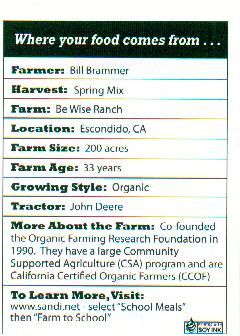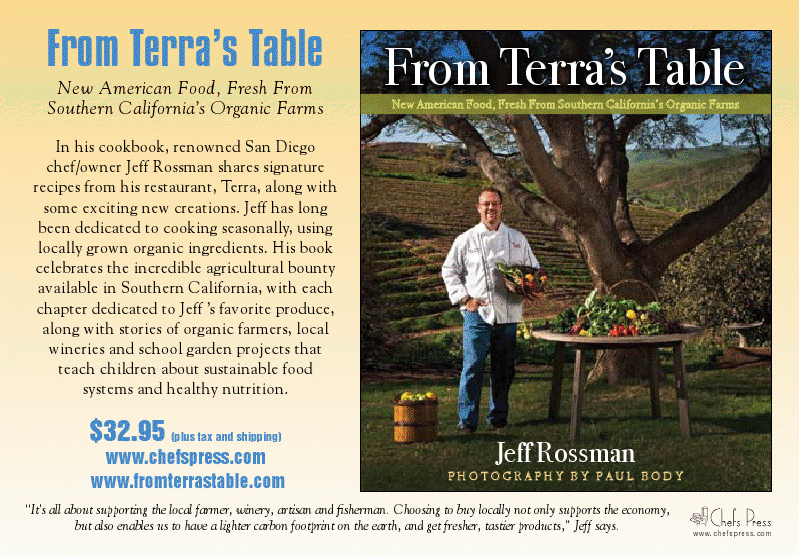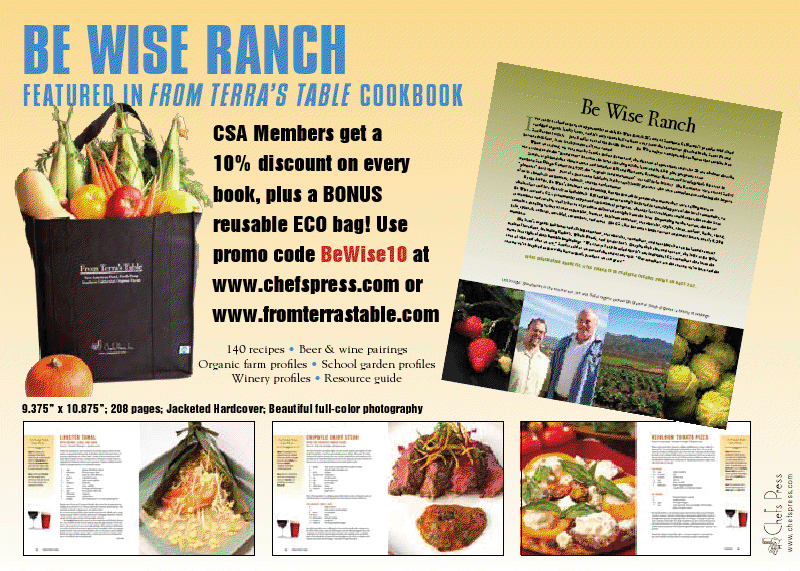




--
The Organic Way
Be Wise Ranch has found success through tenacity and innovation
Originally published October 8, 2010 at 2:19 p.m., updated October 9, 2010 at 9:50 a.m.
A tall man stands in the field, surveying a vast sea of green. It is late summer, and veteran organic farmer Bill Brammer has rivulets of sweat running down his neck. The mercury passed 100 degrees around midday. This oppressive heat is hard on people but great for ripening tomatoes. At peak harvest, workers will pick more than 60,000 pounds of the juicy red fruits from these fields in a single day.If
you buy organic heirloom tomatoes, grape tomatoes or cherry tomatoes at
Trader Joe’s, Whole Foods or Jimbo’s, chances are,
your future tomatoes are growing under Brammer’s gaze. Back
in spring, the organic strawberries you bought at these outlets also
came from “Farmer Bill’s” fields.
Farmer
Bill
Brammer is founder and owner of Be Wise Ranch, the only
organic farm in the San Pasqual Agricultural Preserve and one of the
oldest organic farms in San Diego County. On this property, just a
stone’s throw from the San Diego Zoo
Safari
Park (formerly
the Wild Animal Park) and several acres in nearby Black Mountain,
Brammer’s crews grow organic produce for San Diego specialty
markets, supermarkets and local Costcos. Be Wise Ranch organic tomatoes
and strawberries travel even farther, to Denver
, Texas
and
the Pacific
Northwest.
Starting
small
Farming
wasn’t
Brammer’s intended career path. Or
maybe it was. He grew up north of Los Angeles
in
the San Fernando
Valley at a time when the Valley was mostly chicken ranches, and orange
and walnut groves. He went to college on a golf scholarship and studied
business and philosophy. Still, his heart was in growing plants.
In
1977, Brammer decided to try his hand at farming. He and his brother
took turns driving the bulldozer as they cleared 20 acres of a steep
hillside in what is now 4S Ranch. They planted early season peaches and
nectarines with the intent of creating a niche market. Alas, deer
stripped their first harvest from the trees. The bank was giving farm
loans only for citrus and avocado, so that’s what they
planted next.
While
they waited for the trees to mature, Brammer planted three-quarters of
an acre of tomatoes. With those profits in hand, he rented another five
acres. Be Wise continued to expand until it encompassed 900 acres
between the fields east of Rancho Santa Fe and those in San Pasqual.
But, as farming seems to inevitably give way to development, so has
most of that land. Today, Brammer has a smaller but much more
manageable 230 acres under cultivation.
Fighting
the odds
Be
Wise Ranch’s organic history goes back to Rachel
Carson’s book “Silent Spring,” about the
perils of chemical farming. After reading that, Brammer just
couldn’t fathom farming with synthesized pesticides and
fertilizers. In fact, he says, “the idea for the name Be Wise
came from ‘be smart, be wise, eat
organic.’ ”
It
was a good name, but where to start? Early on, Brammer contacted UC
Davis for help. “When I asked about organic farming, they
told me it couldn’t be done, that I’d
starve,” he recalls.
Undaunted,
Brammer determined to figure it out himself. He became part
of a group of like-minded farmers who gathered at EcoFarm Conferences,
where they shared their successes and failures. From 1990 to 1995, he
was president of the California
Certified Organic
Farmers. During his tenure, CCOF was instrumental in passing
legislation that established both statewide and national organic
farming standards.
Brammer
has more than disproved the prediction that he’d starve. Be
Wise produces at the level of a “conventional” farm
— a fact that is even more impressive considering the huge
challenges of farming in San Diego’s poor soils and with
irrigation water that is four times saltier than drinking water.
“You aren’t supposed to be able to farm under
conditions like this,” Brammer says, “but we do,
and we do it successfully.”
Brammer
has developed a sophisticated fertilizer regimen that includes 14 tons
of compost applied to each acre of soil, every year.
In
addition to compost, Be Wise crops get regular infusions of liquid
nutrients added to the water that flows through the farm’s
drip irrigation system. Still other nutrients are sprayed onto plant
leaves.
While
the water delivers healthful nutrients to the crops, it also delivers
deadly salts that linger in the soil after the water is gone. So
Brammer adds gypsum, powdered calcium sulfate, which counters the salts.
The
labor involved in this effort, not to mention the cost of the
materials, is huge. Each season, Brammer sends soil and plant leaf
samples out for laboratory analysis. The results help him decide how
much of which nutrients to apply and when.
The
CSA explosion
Climate
is Be Wise’s saving grace. In our nearly year-round growing
climate, he can grow two crops on his land each year. So farming 230
acres here produces the same amount as farming 460 acres elsewhere.
That
volume and the diversity of the produce fuel Be Wise’s
Community Supported Agriculture (CSA) program. CSA is a system where
members of the community “subscribe” to a share of
a farmer’s produce.
In
the early
1990s, Brammer read about CSAs in Japan and on the East
Coast. He had tried selling at farmers markets but found it just
wasn’t profitable. So, he says, on Earth Day
in
1994, “we
set up a booth in Balboa Park. We had 200 people sign up. The next
weekend, we invited everyone to visit the farm, and that got us
started.”
Be
Wise CSA chugged along until about five years ago when local interest
in CSAs exploded. Today, 25 percent of Be Wise production goes to feed
more than 2,900 member families. Be Wise trucks deliver 1,600 boxes
each week to 40 drop sites.
CSA
boxes are filled with fresh-picked, organic, locally grown produce
— whatever is ripe that week. Lettuces are year-round, as are
oranges and carrots. Spring and fall bring succulent strawberries.
Basil, squash, tomatoes and peppers dominate summer boxes. Broccoli,
chard and turnips are stars in the cool months.
Farming
is hard work, and a hard way to earn a living, according to Bill
Brammer. Still, he says, “It is fun to look back over the
last 30 years and see how much better the fields look now, and how much
better the crops are and all that we’ve learned.
“It
is still fun to realize you can plant a seed in the ground and if you
do things correctly and nature cooperates, you get a crop.”
-----------------------------------------------------------------------------
The Cardiff School District Cafeteria Manager, Sandy Smith, has been working in conjunction with ourSchool Lunch Committee and a chef from Chickpeas (with funding from the Rob Machado Foundation) to continue our efforts in improving the taste and nutrition of our school lunches. We think you will like the results!
Here are some highlights of the changes that have taken place:
• Spaghetti and other pastas are whole wheat
• Breads are whole grain
• Many entrees are now “vegetable enhanced,” which means that pureed vegetables are included in the recipes for items such as our spaghetti sauce, Mac ‘n cheese, refried beans, turkey tacos, etc. You won’t even have to tell your kids!
• More menu items are homemade in the cafeteria kitchen, such as baked potato wedges instead of frozen French fries, homemade burritos instead of frozen, and many more!
• The cheese pizza now includes a “Choose your own Topping Bar.”
• More fresh and seasonal fruits and vegetables will be available daily from our “Fruit and Veggie Bar.”
• Salad dressings are homemade in the cafeteria kitchen
• BeWise Farms is donating fresh, local, organic produce to the school cafeteria on a regular basis.
• Students at Cardiff School are participating in a "Grow your Lunch"
program where they are growing salad items to be harvested for the school cafeteria.
-----------------------------------------------------------------------------


-----------------------------------------------------------------------------
The Cardiff School District Cafeteria Manager, Sandy Smith, has been working in conjunction with ourSchool Lunch Committee and a chef from Chickpeas (with funding from the Rob Machado Foundation) to continue our efforts in improving the taste and nutrition of our school lunches. We think you will like the results!
Here are some highlights of the changes that have taken place:
• Spaghetti and other pastas are whole wheat
• Breads are whole grain
• Many entrees are now “vegetable enhanced,” which means that pureed vegetables are included in the recipes for items such as our spaghetti sauce, Mac ‘n cheese, refried beans, turkey tacos, etc. You won’t even have to tell your kids!
• More menu items are homemade in the cafeteria kitchen, such as baked potato wedges instead of frozen French fries, homemade burritos instead of frozen, and many more!
• The cheese pizza now includes a “Choose your own Topping Bar.”
• More fresh and seasonal fruits and vegetables will be available daily from our “Fruit and Veggie Bar.”
• Salad dressings are homemade in the cafeteria kitchen
• BeWise Farms is donating fresh, local, organic produce to the school cafeteria on a regular basis.
• Students at Cardiff School are participating in a "Grow your Lunch"
program where they are growing salad items to be harvested for the school cafeteria.
-----------------------------------------------------------------------------


